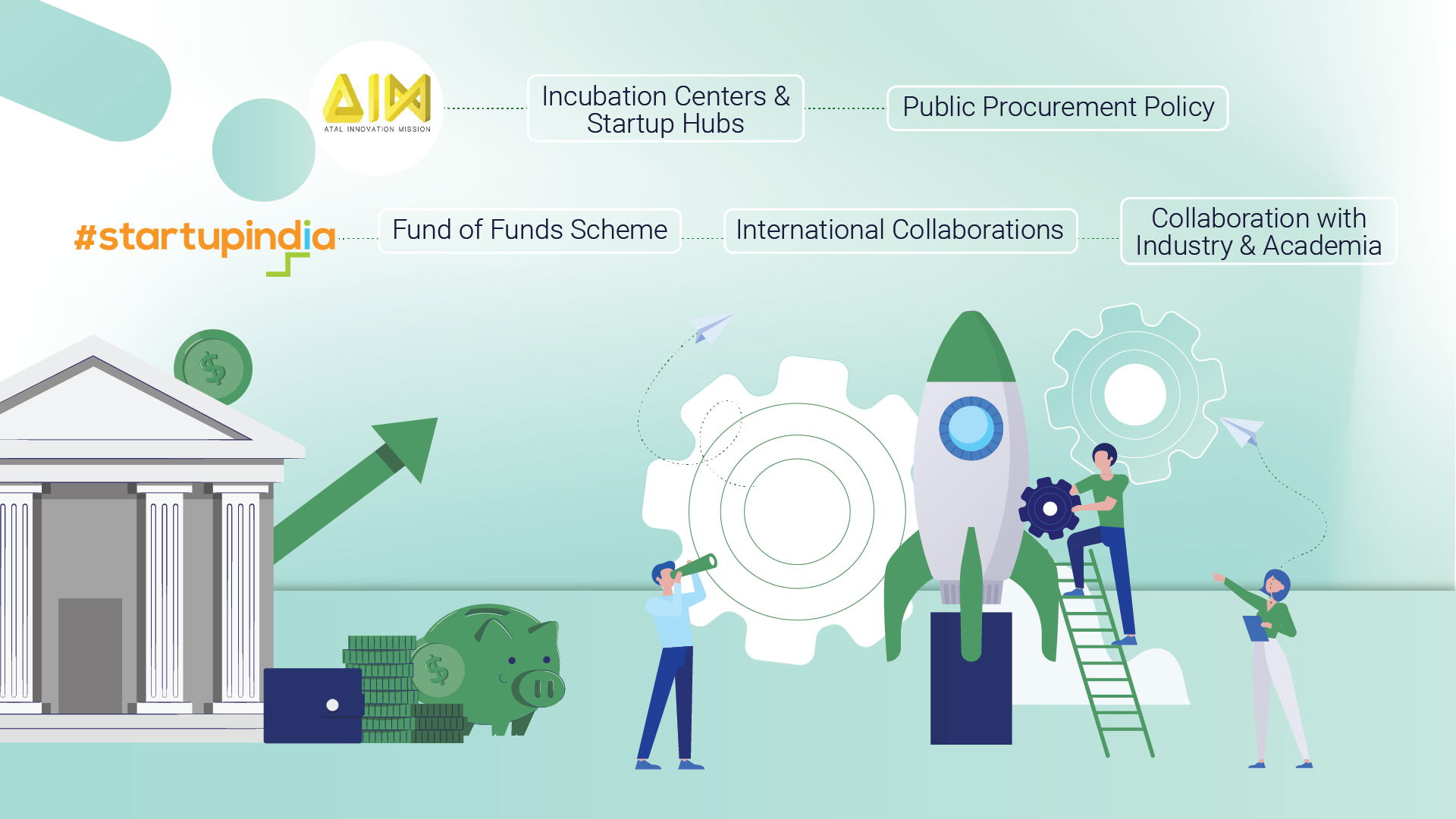Share on

The Union Budget of India plays a pivotal role in shaping the country's startup landscape. It sets the direction for fiscal policies and allocates resources to different sectors. In the context of Indian startups, the Union Budget 2023 has brought about high levels of anticipation and curiosity. This blog post aims to delve into the potential impact of the budget on Indian startups and shed light on the measures introduced to foster their growth and development.
1 Recognition and Support for the Startup Ecosystem:
The Union Budget 2023 has showcased a solid commitment to nurturing the Indian startup ecosystem. The government has acknowledged the significance of startups in driving economic growth, employment generation, and fostering innovation. Consequently, the budget has proposed several initiatives and reforms to support this sector.
2 Taxation Reforms and Incentives:
Recognizing the challenges startups face, the budget has introduced significant taxation reforms and incentives. One of the key announcements is extending the tax holiday for eligible startups by an additional year, providing them with more breathing space to establish their businesses. Amendment to Section 79 of the Income Tax Act, 1961, proposes to extend the period for eligible startups to carry forward and set off losses incurred in the first 10 years which was earlier 7 years from their incorporation. This change comes as a much-needed respite for startups who often face financial challenges in their initial years of operation. Moreover, the threshold for turnover exemption under Section 80-IAC of the Income Tax Act has been raised, offering further relief to startups in their initial years.
3 Facilitating Access to Capital:
Access to capital is crucial for startups to scale and expand their operations. The government has acknowledged this need and taken steps to facilitate capital flow into the startup ecosystem. The budget proposes the establishment of a 'Startup India Seed Fund' with a corpus of INR 1,000 crore, aiming to provide early-stage funding to startups. This initiative aims to bridge the funding gap and empower startups with the necessary resources to fuel their growth.
4 Encouraging Innovation and Research:
Innovation lies at the heart of startup success. To foster a culture of innovation and enterprise, the 2023 Union Budget has allocated funds for research and development (R&D) activities. The government has proposed the creation of a National Research Foundation (NRF) with a budget of INR 50,000 crore over five years. This initiative aims to support cutting-edge research and collaboration between academia and industry, creating a favorable environment for startups to thrive.
5 Simplifying Regulatory Processes:
Streamlining regulatory processes and reducing bureaucratic hurdles are essential to promote entrepreneurship and attract investments. The budget emphasizes the government's commitment to ease of doing business by introducing reforms to simplify compliance requirements. The introduction of a single-window clearance system for startups and the simplification of the Goods and Services Tax (GST) process are significant steps toward creating a business-friendly environment.
6 Boosting Digital Infrastructure:
Acknowledging the importance of robust digital infrastructure for the growth of startups, the 2023 Union Budget has allocated significant funds for its development. The government aims to improve broadband access in rural areas and expand the reach of high-speed internet. This investment will enable startups to leverage technology and reach untapped markets, fostering inclusive growth and development.

From tax incentives to enhanced access to funding and support for innovation, these measures hold the potential to unlock new opportunities and propel the startup landscape to new heights. Apart from these measures, multiple other tools, funds, and initiatives by the government aim to foster startup growth in India.
Startup India Initiative: The government launched the "Startup India" campaign to promote entrepreneurship and provide a supportive environment for startups. This initiative aims to simplify regulations, offer tax benefits, and facilitate access to funding for startups. It includes various programs and schemes to nurture and mentor startups at different stages of their growth.
Fund of Funds Scheme: With a pool of INR 10,000 crore, this fund invests in registered Alternative Investment Funds (AIFs), which, in turn, provide funding to startups. The FFS plays a crucial role in bridging the funding gap and attracting private investment in the startup ecosystem.
Incubation Centers and Fundraising Platforms: The government has set up incubation centers and Fundraising Platforms across the country to provide startups with infrastructure, mentoring, networking opportunities, and access to investors. These centers serve as collaborative spaces for startups to develop their ideas, receive guidance, and accelerate their growth.
Public Procurement Policy: The government has introduced a Public Procurement Policy to promote the participation of startups in government tenders. Under this policy, startups are given certain relaxations regarding prior experience, turnover, and earnest money deposits, allowing them to compete on a level playing field with larger companies.
Collaboration with Industry and Academia: The government has encouraged collaboration between startups, industry, and academia to foster innovation and knowledge exchange. It has facilitated partnerships between startups and established companies, enabling startups to gain access to resources, expertise, and market opportunities.
International Collaborations: The government has actively sought collaborations and partnerships to support startups. Initiatives such as the India-Israel Innovation Bridge and the India-Sweden Collaborative Industrial Research and Development Program provide startups with opportunities for international exposure, technology transfer, and access to global markets.
The backing of the Indian government through these initiatives and policies has significantly boosted the startup ecosystem in the country. It has created an enabling environment for startups to thrive, attract investments, and contribute to India's overall economic growth and development.

The 2023 Union Budget of India has brought a wave of optimism for startups operating in the fields of agritech, climate tech, electric vehicles (EV), and financial technology (fintech). The budget demonstrates the government's commitment to fostering innovation and sustainable development in these sectors. This article explores the specific benefits that agritech, climate tech, EV, and fintech startups can derive from the 2023 Union Budget. From funding opportunities to policy support and market incentives, these measures hold the potential to accelerate growth and contribute to a more sustainable and digitally driven economy.
Agritech Startups: Empowering the Agriculture Sector
The 2023 Union Budget focuses on transforming India's agriculture sector and offers significant benefits to agritech startups. The budget emphasizes the development of farmer-centric policies and schemes, providing a favorable environment for agritech startups to thrive. The establishment of the 'Agri Infra Fund' with a corpus of INR 1 lakh crore and the proposed reforms in the agricultural marketing ecosystem offer opportunities for startups to create innovative solutions and strengthen the agriculture value chain. The Agriculture Accelerator Fund is also set up to encourage aspiring entrepreneurs in the agriculture and allied sectors by offering financial assistance to establish their startups. At the idea/pre-seed stage, funding of INR 5.00 lakh is provided, while at the seed stage, entrepreneurs can avail of financial support up to INR 25 lakh. The budget promotes the adoption of technology in farming practices and offers incentives for startups leveraging artificial intelligence, machine learning, and IoT to enhance productivity and sustainability.
Climate Tech Startups: Encouraging Sustainable Solutions
The 2023 Union Budget places a strong emphasis on addressing climate change and promoting sustainable development. This focus presents a significant opportunity for climate tech startups to drive innovation and contribute to environmental sustainability. The budget introduces various incentives and support mechanisms, such as tax incentives for renewable energy projects, green bonds, and grants for research and development in clean energy technologies. Additionally, the proposed establishment of the National Hydrogen Energy Mission and the increased focus on electric mobility create avenues for climate tech startups to develop and deploy sustainable solutions.
The 2023 Union Budget aims to promote electric mobility and reduce dependence on fossil fuels. This presents a favorable environment for EV startups to thrive. The budget proposes several measures to support the EV ecosystem, including tax incentives, subsidies for EV manufacturing, and the development of charging infrastructure. These measures encourage EV startups to innovate and capitalize on the growing demand for sustainable transportation solutions. Furthermore, the budget's focus on reducing import duties for critical EV components encourages domestic manufacturing, fostering the growth of the EV startup ecosystem.
Fintech Startups: Advancing Digital Financial Inclusion
The 2023 Union Budget places a strong emphasis on digital financial inclusion and the expansion of fintech services. Fintech startups stand to benefit from the budget's focus on creating a robust digital infrastructure, promoting digital payments, and enhancing financial literacy. The budget proposes measures to enhance digital connectivity, strengthen cybersecurity, and facilitate seamless digital transactions, creating an enabling environment for fintech startups. Additionally, the budget's focus on promoting microfinance institutions and digital lending platforms presents opportunities for fintech startups to leverage technology and reach underserved populations with innovative financial solutions.
Conclusion:
The 2023 Union Budget of India demonstrates a clear vision to foster innovation and sustainable development across various sectors. Agritech, climate tech, EV, and fintech startups stand to benefit significantly from the measures introduced in the budget. As these measures unfold, it will be exciting to witness the positive impact on the growth, innovation, and overall sustainability of the startup community in India.
POD is owned by Crowdpouch Ventures Services Private Limited and reserves all rights to the assets, content, services, information, and products and graphics in the website but third party content. Crowdpouch does not solicit, advertise, market any of the users registered with POD, neither does it solicit investors by offering leagues/schemes/competitions etc. related to securities markets. POD hereby clarifies that it does not carry any resemblance to the stock exchange nor does it facilitate trading of securities nor does it act like a broker/agent/media for raising funds. Investment through POD does not carry rights of renunciation. Investors are cautioned that POD operates in an unregulated space hence, investment through POD is subject to investment risk. Investments in startups are highly illiquid.